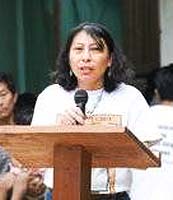Punta Gorda, Belize : +501-670-0993 (BZ), +001-301-328-2022 (US)

ABOUT JCS
Mission Statement
Julian Cho Biography
Staff & Affiliates
Partner Organizations
Press Releases
Support & Funding
 ulian
ulian
 rmando
rmando
 ho
ho
April 6, 1962 – December 1, 1998
 Julian Armando Cho, a native Belizean Mopan Maya, was born in the village of San Jose in the Toledo District of Belize. The sixth child of Mr. and Mrs. Juan Cho, Julian was driven with determination to educate himself. He attended high school at St. Peter Claver College in Punta Gorda Town; tertiary level education at St. John’s College, Junior College, in Belize City; and received a Bachelor of Arts degree in Philosophy from St. Louis University, Missouri, in the United States. Julian’s educational mission crossed paths with the Society of Jesus. He was drawn to their work in education, human rights, and social justice; hence he contemplated becoming a Jesuit priest. However, Julian pursued a different path by returning to Belize where he served as an English teacher at St. John’s College(1990-1991), Sacred Heart College (1991-1994), and the Toledo Community College (1994- 1998). Julian later married Magdalena Coc in December of 1992. Julian and Maggie were blessed with two children, son Ian Cho (1994), and daughter Ingrid Cho (1998).
Julian Armando Cho, a native Belizean Mopan Maya, was born in the village of San Jose in the Toledo District of Belize. The sixth child of Mr. and Mrs. Juan Cho, Julian was driven with determination to educate himself. He attended high school at St. Peter Claver College in Punta Gorda Town; tertiary level education at St. John’s College, Junior College, in Belize City; and received a Bachelor of Arts degree in Philosophy from St. Louis University, Missouri, in the United States. Julian’s educational mission crossed paths with the Society of Jesus. He was drawn to their work in education, human rights, and social justice; hence he contemplated becoming a Jesuit priest. However, Julian pursued a different path by returning to Belize where he served as an English teacher at St. John’s College(1990-1991), Sacred Heart College (1991-1994), and the Toledo Community College (1994- 1998). Julian later married Magdalena Coc in December of 1992. Julian and Maggie were blessed with two children, son Ian Cho (1994), and daughter Ingrid Cho (1998).
Julian's belief in social justice led him to join the Toledo Maya Cultural Council (TMCC), a group working for the indigenous people of the Toledo District. His dedication and contribution led the founding fathers of TMCC and the indigenous communities to unanimously elect him as chairman of the council in December 1995. Julian brought international attention to TMCC as a force for indigenous rights. He established partnerships with other organizations throughout the world; and strengthened the financial and human resources of TMCC. Julian also mobilized his people into functional groups, inspiring the formation of the Toledo Alcalde Association (TAA), and the Toledo Maya Women's Council.
On December 3rd 1995, Julian led his people into a peaceful demonstration march to voice their concerns over the granting of logging concessions on indigenous lands. Julian was concerned about deforestation, and the resultant threat to the livelihood of nearby communities. His remarkable ability to mobilize communities and his strong affiliation with the Indian Law Resource Center (ILRC) enabled him to effectively challenge the government of the day. Under his leadership TMCC along with the TAA sued the government of Belize for not recognizing and respecting the land and resource rights of the Maya communities. Julian’s efforts received international attention. Hence, international concern initiated the evaluation and mapping of areas inhabited by the Mayas, a project that resulted in the production of the Maya Atlas. Cho’s last and final victory was the signing of a Memorandum of Understanding, November 25, 1998, with the Prime Minister of Belize to negotiate a solution to the Maya land rights struggle.
Julian Cho was a man truly devoted to social justice and to the protection of the environment. Cho’s untimely death in December, 1998 was a huge loss to the Maya people and to the environment of southern Belize. While the facts behind his death remain unresolved; popular opinion asserts that Cho may have been a victim of his work as a human rights advocate. Nevertheless, his legacy lives on. The Belize Audubon Society posthumously awarded Cho the James A. Waight Conservation Award for his tireless efforts in the protection and enhancement of Belize's Environment; and his efforts to advocate on behalf of the Maya people. The Julian Cho Technical High school was also named in his honor. Every year on April 6, Julian Cho is celebrated and remembered as a dedicated, Maya leader, human rights activist, friend, father, and a son of the Toledo District.

Julian's wife,
Magdalena C. Cho

Julian's parents, Juan and Juana Cho, with his children, Ian and Ingrid Cho

Ian Cho playing the saxophone at Julian's memorial ceremony




